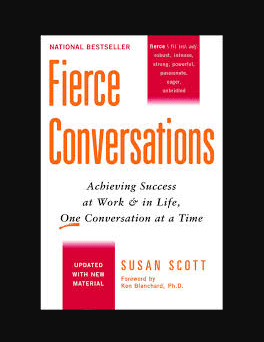My boss Bob was a dominating bully. His idea of brainstorming was to disparage each suggestion until everyone at the table shut up and his idea was the only one left standing.
I thought of Bob when I saw the book “Fierce Conversations” by Susan Scott. Bob
seemed fierce, but the book “Fierce Conversations” is about something entirely different.
Scott says each conversation we have with coworkers, customers, significant others and children either enhances those relationships, flat-lines them or takes them down.
Fierce conversations are about moral courage, clear requests and taking action. Fierce is an attitude, a way of conducting business, a way of leading and a way of life.
Fierce Conversations has Seven Principles.
Principle 1: Question reality
Companies and marriages derail because people don’t say what they’re really thinking. One of the goals in fierce conversations is to get everyone’s reality on the table so it can be cross-examined. Everyone’s!
Principle 2: Come out from behind yourself into the conversation to make it real
What are you pretending not to know? While the desire to please isn’t a flaw, we sometimes go too far. When faced with a moment of truth, we find ourselves avoiding the truth in exchange for a trinket of approval.
Principle 3: Be here, be nowhere else
“While someone is talking, where are your thoughts?” When you’re talking with someone on the phone, do you scan your email? Are you so unengaged or unengaging that no one hears or really listens to you? Maybe you’re too polite or too cautious. The bottom line is that we end our conversations before they start, afraid of what we might say or hear. Fierce conversations are about asking questions until all points of view have been dug out.
Principle 4: Tackle your toughest challenge today
Ongoing problems in an organization often stem from root issues. If you know something must change, then know that you must be the one who starts the change. When we confront behavior with courage and skill we are offering a gift. Healthy relationships require appreciation and confrontation.
Principle 5: Follow your instincts
Your gut acts as in internal compass that can serve as a powerful guide. It happens automatically, but you have to learn to listen.
Principle 6: Take responsibility for your emotional wake
When you are a leader, no comment is trivial. Something you might not even remember saying may have a devastating impact on an individual looking to you for guidance and approval. Conversely, something you said years ago may have encouraged and inspired someone who is grateful to you this day. Positive or negative, our personal wakes are deeper than we know.
Principle 7: Let silence do the heavy lifting
American’s are often uncomfortable with silence in conversations, in homes and in workplaces. In conversations, the more emotionally loaded a subject is,the more silence is required.
Never mistake talking for conversation. Silence is the best-kept secret for generating dialogue.
As a leader, your job is to accomplish goals; every conversation you have needs to be as real as possible. It has to accomplish something useful. When you become more candid with people, relationships deepen, trust grows and we become more effective. Leaders who take the time to get real have emotional honesty and integrity. They have a greater capacity to hold true to their vision and enroll others in it. They become more compelling people.
 Fierce conversations engages people. Companies who engage their
Fierce conversations engages people. Companies who engage their
employees become more successful and more profitable. The statistics shared in this presentation are astounding!

